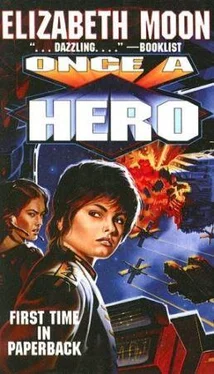Elizabeth Moon - Once a Hero
Здесь есть возможность читать онлайн «Elizabeth Moon - Once a Hero» весь текст электронной книги совершенно бесплатно (целиком полную версию без сокращений). В некоторых случаях можно слушать аудио, скачать через торрент в формате fb2 и присутствует краткое содержание. Жанр: Космическая фантастика, Боевая фантастика, на английском языке. Описание произведения, (предисловие) а так же отзывы посетителей доступны на портале библиотеки ЛибКат.
- Название:Once a Hero
- Автор:
- Жанр:
- Год:неизвестен
- ISBN:нет данных
- Рейтинг книги:3 / 5. Голосов: 1
-
Избранное:Добавить в избранное
- Отзывы:
-
Ваша оценка:
- 60
- 1
- 2
- 3
- 4
- 5
Once a Hero: краткое содержание, описание и аннотация
Предлагаем к чтению аннотацию, описание, краткое содержание или предисловие (зависит от того, что написал сам автор книги «Once a Hero»). Если вы не нашли необходимую информацию о книге — напишите в комментариях, мы постараемся отыскать её.
Once a Hero — читать онлайн бесплатно полную книгу (весь текст) целиком
Ниже представлен текст книги, разбитый по страницам. Система сохранения места последней прочитанной страницы, позволяет с удобством читать онлайн бесплатно книгу «Once a Hero», без необходимости каждый раз заново искать на чём Вы остановились. Поставьте закладку, и сможете в любой момент перейти на страницу, на которой закончили чтение.
Интервал:
Закладка:
All too soon, she had to come back to her own experience. She skipped over the internal battle for control of Despite . She had relived that too many times for the court to do it again, for these callow youngsters. But they needed to know how the battle ended, including the mistakes she had made.
“We came in too fast,” she said, displaying yet another visual. “My concern was that we might arrive too late, and I assumed that any insertion barrage would be sufficiently dispersed. As you know, calculation of real elapsed time in multiple FTL hops is difficult at best—but the error is usually negative, not positive. As it happened, we made it through insertion safely, and skip-jumped to here—” she pointed. “Without dumping enough residual vee. We were short-crewed, with some damage to the nav computers, so I couldn’t get a quick solution to a microjump that would have allowed the right angular motion. So . . . we blew past Xavier, and in that interim Paradox took fatal damage.” More than eighteen hundred dead. Her fault. War left no margin for mistakes. She remembered the desperate scramble on the bridge of her ship, the bridge crew fighting to get control, to get a jump solution that would let them get back in time to do some good.
“We got a jump solution,” she said, leaving out the rest of it, that instant when she had to accept it, with the risk, or not. The risk had been substantial—the confidence interval on that very unorthodox jump was broad enough that they could have gone right into Xavier itself. “And we came out of jump with a clear shot up the rear of the Benignity command cruiser.” And a vector that gave them only one chance for that shot. The crew that had resented losing a chance to become the Sector gunnery champions had made their shot in the narrow window . . . and then had managed to reposition Despite in a stable orbit.
“The Board of Inquiry,” Esmay said, “did not approve of the means, though they liked the results.” She didn’t want to discuss that; she hurried on to show how the Xavieran defenses had contributed: the suicidal use of phase cannon on a shuttle, the improvised mines, little Grogon ’s few telling shots, the yacht’s astonishing defeat of the killer-ship.
“Only because they weren’t expected,” Esmay pointed out. “The Benignity ship intended ambush—post-battle analysis picked up enough transmissions to know that—and simply didn’t know the yacht was there. When it shut down active systems to lie low for several hours, it was an easy target.”
“What difference would it have made if Despite had also been in the Xavier system the whole time?”
An intelligent question, but difficult. “By the ship stats, it would have improved the odds ratio only about fifteen percent. To my own knowledge, Despite had the best weapons performance in the Sector: whatever Hearne’s failings, she demanded and got quick and accurate fire from her crew. But if it had stayed, it would have been a known quantity, and Commander Serrano’s force would still have been outnumbered and outgunned. I haven’t seen any of the senior analysts’ reports, but my own guess is that its contribution throughout the long battle would have been less than its effectiveness as an unexpected opponent at the end. That is, however, only my guess—it does not change the fact that the lack of another hull severely limited Commander Serrano’s choices of action—and that its absence was the result of treason.”
Silence, attentive and almost breathless. Esmay waited. Finally someone shifted, a very audible rasp of clothing against the seat cushions, and that broke their immobility. Ensign Dettin clambered up to take the podium, and thank her for her talk. Hands rose for more questions, but Esmay caught sight of senior rank in the rear. When had they come in? She hadn’t noticed . . . but certainly no ensign guarding the door from other ensigns would refuse entry to the handful of majors and lieutenant commanders gathered there.
Dettin saw them, finally, and stopped short in his closing remarks. “Uh . . . sir . . . ?”
Commander Atarin, Esmay finally recognized as he moved out of the dimness back there and into the light. “I presume you’d be willing to give the same briefing to senior officers?”
A shiver of apprehension ran down her backbone. She couldn’t tell if he was angry, or amused; she didn’t know whether to apologize or explain. Both were bad ideas, her family heritage reminded her. “Of course, sir.” She choked back the automatic qualifiers: if she wasn’t really qualified, why was she showing off to the ensigns?
“If I could have a word . . .” he murmured, his glance raking the ensigns, who immediately began scrambling from their seats to leave by the other entrance.
“Of course, sir.” Esmay retrieved her display cube from the projector, and came down from the dais. Major Pitak was not one of the officers there, and she didn’t recognize any of the others besides Atarin. They gazed at the departing ensigns with the kind of neutral expression which she interpreted as trouble on the half-shell and bubbling from the broiler. Atarin said nothing more until the ensigns had gone.
“Very clearly explained, I thought,” he said then. Esmay did not relax; from his tone he might have been discussing a textbook, and she wasn’t sure whether she was being considered the textbook’s author or its topic. “I was impressed with your analysis of your own errors.”
Textbook case of junior officer putting feet clumsily in mouth, then.
“Just how badly was that nav computer damaged?”
A factual question she could answer. “It had taken direct fire—we’d replaced components from storage, but we couldn’t get the microjump functions within 80 percent of normal function.”
One of the other officers spoke up. “Couldn’t you have used components from the weapons board? There’s duplication in some of that, if I recall. ”
“Yes, sir, there is. But we didn’t want to risk having any delay in target acquisition or getting a firing solution.”
“Umm. So you were skip-jumping with a faulty system . . . a bit risky, wasn’t it?”
Esmay could think of no real answer but a shrug; one did not offer shrugs. “Somewhat risky, yes sir.” It had been terrifying at the time, as the confidence intervals broadened and she had had to feel her way from one jump to the next. Instinct, she had been well taught, made a lousy guide to navigation in space.
“When I read the Board of Inquiry report,” Atarin said, “I didn’t notice that they acknowledged the difficulty with the nav computer. I presume you mentioned it.”
“It was in the record, sir,” Esmay said. She had not dwelt on the difficulties it presented; it would have been whining, making excuses.
“Yes. Well, Lieutenant Suiza, I think you’d better expect an invitation to the senior tactics discussion group. I quite realize that you aren’t a senior analyst—but I doubt we can resist having a firsthand account of so . . . striking . . . an engagement.”
“Yes, sir.”
“And you might want to check the orientation of your illustration eight . . . I think you’ve got the axes rotated ninety degrees . . . unless there was a reason for that.”
“Yes, sir.”
With a nod, Atarin led the other officers out. Esmay felt like falling into one of the seats and shaking for a half hour, but Dettin was peeking in at her, obviously hoping to chat.
“So you don’t think she’s rousing the ensigns to any sort of . . . undesirable activity?”
“No, sir. You know how ensigns are: they’ll go after anyone with real experience to talk about. They love gory stories, and that’s what they were hoping for. Instead, she gave them a perfectly straightforward account, as unexciting as possible, of an innately thrilling engagement. Absolutely no self-puffery at all, and no attempt to romanticize Commander Serrano, either. I’ve invited her to address the senior tactics discussion group—she’ll get more intelligent questions there, but I suspect she’ll answer them as well.”
Читать дальшеИнтервал:
Закладка:
Похожие книги на «Once a Hero»
Представляем Вашему вниманию похожие книги на «Once a Hero» списком для выбора. Мы отобрали схожую по названию и смыслу литературу в надежде предоставить читателям больше вариантов отыскать новые, интересные, ещё непрочитанные произведения.
Обсуждение, отзывы о книге «Once a Hero» и просто собственные мнения читателей. Оставьте ваши комментарии, напишите, что Вы думаете о произведении, его смысле или главных героях. Укажите что конкретно понравилось, а что нет, и почему Вы так считаете.












